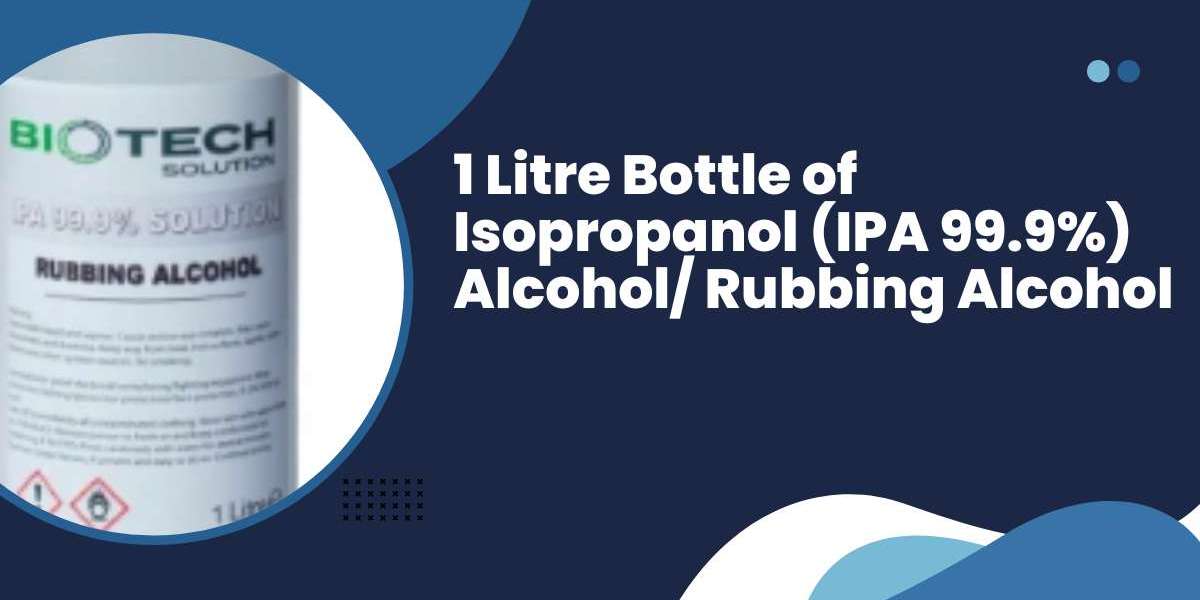Known for its versatility and effectiveness, isopropyl alcohol has become a staple in homes, laboratories, and industries. From disinfecting surfaces to acting as a solvent for everyday cleaning tasks, this simple compound boasts numerous applications that make it indispensable. Let’s delve into the world of isopropyl alcohol and explore its benefits, safety, and how it stands out as a trusted solution.
What is Isopropyl Alcohol?
Isopropyl alcohol, or rubbing alcohol, is a colorless, flammable chemical compound with a strong odor. Due to its properties as a solvent and disinfectant, it is commonly used in a wide range of applications. Chemically referred to as C₃H₈O, this alcohol is widely available in concentrations ranging from 70% to 99%.
Key Properties:
- Evaporates quickly without leaving residue
- Excellent solvent for oils and greases
- Powerful germ-killing agent
The History and Development of Isopropyl Alcohol
Isopropyl alcohol was first developed in the 1920s as a byproduct of petroleum refining. Its affordability and effectiveness quickly led to widespread use in healthcare, cleaning, and manufacturing. The compound has become a cornerstone of infection control and hygiene practices worldwide.
Top Uses of Isopropyl Alcohol in Daily Life
The applications of isopropyl alcohol are extensive. Here’s a closer look at its common uses:
Cleaning Electronics:
Its quick evaporation and non-corrosive nature make it ideal for cleaning delicate electronics like keyboards and phone screens.
Disinfecting Surfaces:
Used to kill germs and bacteria on countertops, doorknobs, and other high-touch areas.
Removing Sticky Residue:
Removes adhesive residues left by labels or tape.
Glass Cleaning:
It helps achieve streak-free windows and mirrors when diluted with water.
First Aid:
Cleans minor cuts and scrapes, reducing the risk of infection.
Why is Isopropyl Alcohol Effective for Cleaning?
The cleaning power of isopropyl alcohol comes from its ability to break down oils and dissolve dirt. Its fast evaporation rate ensures surfaces dry quickly, leaving no marks or water spots behind.
Isopropyl Alcohol as a Disinfectant
Healthcare settings rely heavily on isopropyl alcohol for its antimicrobial properties. It’s proven to kill 99.99% of germs when used correctly. According to the CDC, solutions containing at least 70% isopropyl alcohol are effective against most viruses, bacteria, and fungi.
Safety Tips for Using Isopropyl Alcohol
Although isopropyl alcohol is a versatile tool, it’s essential to use it safely:
- Please keep away from open flames, as they are highly flammable.
- Avoid ingestion, as it is toxic if consumed.
- Use in a well-ventilated area to reduce inhalation risks.
- Store out of reach of children.
Isopropyl Alcohol vs. Ethanol: What’s the Difference?
While both are effective disinfectants, isopropyl alcohol and ethanol differ in their applications:
| Feature | Isopropyl Alcohol | Ethanol |
|---|---|---|
| Drying Speed | Faster | Moderate |
| Odor | Strong | Mild |
| Skin Irritation | More likely | Less likely |
| Cost | Affordable | Slightly higher |
Industries that Rely on Isopropyl Alcohol
Isopropyl alcohol plays a vital role in various industries, including:
- Healthcare: Sterilizing medical equipment and disinfecting surfaces.
- Manufacturing: Cleaning machinery and precision tools.
- Automotive: Remove grease from parts and prepare surfaces for painting.
DIY Cleaning Solutions with Isopropyl Alcohol
Creating homemade cleaning products with isopropyl alcohol is cost-effective and straightforward.
All-Purpose Cleaner:
Mix equal parts of isopropyl alcohol and water in a spray bottle for a powerful, streak-free cleaner.
Hand Sanitizer:
Combine 2/3 cup of 99% isopropyl alcohol with 1/3 cup aloe vera gel.
Mirror Cleaner:
Mix one part isopropyl alcohol with two parts water and a drop of dish soap.
Environmental Impact of Isopropyl Alcohol
As a biodegradable compound, isopropyl alcohol poses minimal environmental risks when used responsibly. However, improper disposal can harm water systems. Always adhere to local disposal guidelines.
Common Myths About Isopropyl Alcohol
Myth: Higher concentrations are always better.
Truth: A 70% solution is more effective for disinfection as it penetrates cell walls more efficiently.
Myth: It’s safe to use on all surfaces.
Truth: Avoid using isopropyl alcohol on certain plastics and painted surfaces, as it may cause damage.
How to Choose the Right Concentration of Isopropyl Alcohol
Selecting the right concentration depends on the task:
- 70% Solution: Best for general disinfection.
- 90%+ Solution: Ideal for electronics and quick-drying applications.
Can You Use Isopropyl Alcohol on Skin?
While isopropyl alcohol is commonly used in first aid, prolonged exposure can irritate the skin. It’s best to dilute it on sensitive areas and follow up with a moisturizer.
Isopropyl Alcohol During the Pandemic
The global demand for isopropyl alcohol surged during the COVID-19 pandemic as it became a critical component of hand sanitizers and surface disinfectants.
FAQs
What is the shelf life of isopropyl alcohol?
Properly stored, isopropyl alcohol can last up to three years, but its effectiveness may diminish over time.
Can you dilute isopropyl alcohol with tap water?
Yes, but distilled water is preferred to avoid mineral deposits.
Is isopropyl alcohol safe for pets?
No, ingestion or exposure can be toxic to pets.
What should I do if I accidentally ingest isopropyl alcohol?
Seek medical attention immediately, as it is highly toxic.
Can I use isopropyl alcohol on painted surfaces?
Avoid this, as it may strip paint or damage the finish.
How does isopropyl alcohol compare to hydrogen peroxide?
Both are effective disinfectants, but isopropyl alcohol evaporates faster, making it more convenient for some uses.
Conclusion
Isopropyl alcohol continues to prove its worth as a reliable, multipurpose solution for cleaning, disinfecting, and more. Its widespread availability and affordability make it an essential part of modern living. By using it responsibly and understanding its capabilities, you can harness the full potential of this incredible compound.








